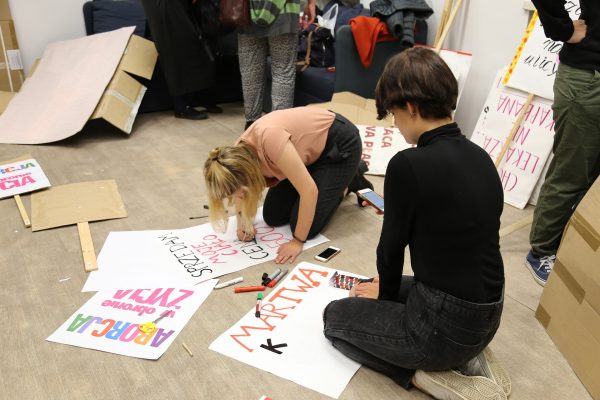
Another war on women? The Polish attempt to ban abortion
As women’s rights activists know only too well, sexual and reproductive rights are often redefined when major social and political changes take place. Poland‘s case is exemplary in this respect: legal and relatively straightforward under communism, access to abortion came under attack after 1989, and in 1993 a law that allowed it only on therapeutic grounds and on criminal charges was passed. The procedure is in fact currently only permitted in cases of serious health risks for the woman or the foetus or where a pregnancy results from rape or incest, making the country’s legislation on the matter among the strictest in Europe.
Pro-life organisation Ordo Iuris has now drafted a bill that, if approved, would enforce a complete ban on abortion and increase penalties for medical professionals caught performing it. The conservative Law and Justice Party (PiS), elected to government in October 2015, favours the proposal, which, along with the announced plan to ban prescription-free emergency contraception and end state funding to in vitro fertilisation testifies to a clear intention to limit the country’s reproductive rights.
The move has obviously spurred waves of protest across the country, with women taking the streets in protest brandishing coat-hangers – a tool reportedly used to terminate pregnancies and which recalls the reality of underground abortion – and reportedly walking out on masses after priests read a statement in support of the total prohibition. Public opinion on the matter in Poland is divided: while many Poles morally object to the act of abortion, most of them oppose further restrictions to the current law and believe that the procedure should be allowed in cases such as those currently provided for.
While anti-abortionists insist on the intrinsic value of all human life and the need to protect it as the main reason for the proposed ban, many worry that a total prohibition would put women’s lives and health at greater risk, determining an increase in the number of clandestine procedures, both self-induced and performed illegally by health professionals.

Women in Poland have already a hard time accessing abortion when they are legally entitled to do so, having to face the social stigma associated with it and the prohibitive prices of the procedure, but also the ostracism of medical personnel: women have reported that many doctors in fact object to abortion on conscientious grounds, are unwilling to provide correct information to the woman in cases of health risk or foetal abnormality or intentionally extend the timescale of the necessary checks until it is too late to perform the procedure.
Many women feel discouraged and intimidated and choose to avoid these obstacles by travelling abroad to have the procedure carried out, but they incur in large expenses and have to face the risks associated with seeking treatment for eventual complications upon their return to the country (Polish law currently doesn’t punish the woman but medical professionals and eventual helpers may risk up to two years in jail). As it’s often the case in such instances, the complete criminalisation of abortion is likely to end up penalising even more those who do not have the resources to seek alternative solutions, and playing in the hands of those who profit from clandestine procedures.
All these risks are known to the organisations that support the ban – although they contest some of the prohibition’s opponents’ figures – but other than paying lip service tho the idea that provisions should be put in place by the state to support women who are pregnant as a result of violence and families with disabled children, they rarely address the issues raised by the prospect of full criminalisation. Those who favour a complete abortion ban depict it as a measure aimed at protecting human life understood as an intrinsic and universal value, but their partiality is striking when considering how little interest they show in preserving the lives of women who carry unwanted pregnancies, being it from physical and mental health risks or poor life conditions.
One would expect that those who oppose abortion would go to great lengths to ensure that valid alternatives to it are available, and that support measures that would help reduce the numbers of women resorting to the procedure are implemented. The lack of a significant effort in this sense makes attempts to prevent women from terminating unwanted pregnancies look like attacks on women’s rights in favour of the affirmation of ever-stronger anti-democratic and misogynistic power alliances.
More than anything else, Poland’s proposed abortion ban is today symptomatic of the wave of political conservatism that has swept across Europe in the years since the economic crisis, a political shift that is being negotiated on the bodies and lives of women and girls. If approved, a complete prohibition of pregnancy termination in Poland would set a sad precedent for us all, sanctioning the principle that we can see our hard-won rights disappear at the whim of illiberal governments that aim to transform their countries into new bastions of political and religious conservatism.
It may seem superfluous to say that abortion is a fundamental right, but if it needs re-stressing then we need to make clear that #westandwithpolishwomen.
Cover picture: View of Warsaw, Poland. Image by Cimedia / Pixabay
abortion, Europe, featured, poland